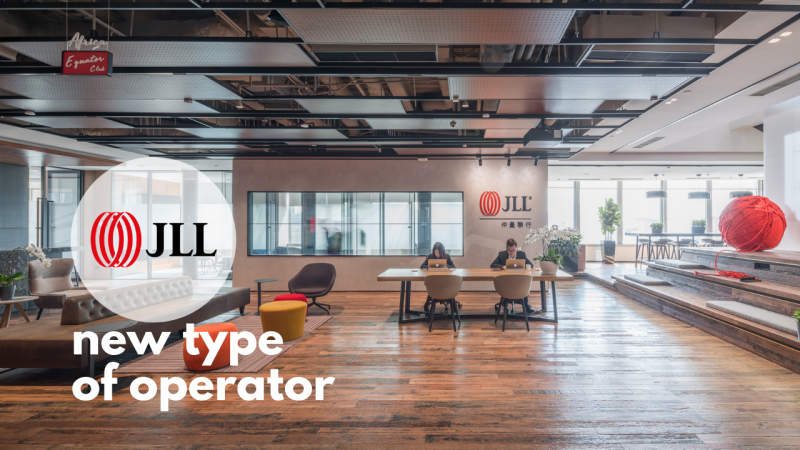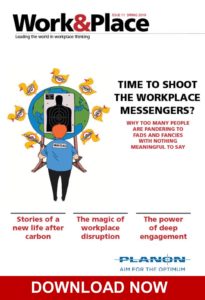- Allwork.Space spoke with JLL’s Tom Carroll, Director of EMEA and UK Corporate Research, and Dan Brown, Head of Flex Space EMEA, to discuss what’s driving industry growth.
- Major developers are looking to integrate flexible space into their assets, which is ushering in a “new type of operator” bent on offering more choice to corporates.
- The Future of Work is ultra-mobile, tech enabled and focused on the human experience, which is central to the development of successful real estate and business strategy.
According to a recent JLL report, “in 2017 alone, the total amount of flexible space in the top 20 largest flex markets globally grew by 30% – equivalent to around 1 million square meters.”
Moreover, the impressive growth of the market can be in part attributed to corporates adopting flexible workspace solutions. This type of user is particularly attracted to hybrid flexible space offerings; meaning it leans towards locations that offer both privacy and community.
Hybrid models started popping up as early as 2015, though it wasn’t until recently that they became the staple flexible workspace model. From the operator perspective, hybridization made sense, especially for operators targeting larger companies as a way to generate more resilient revenue streams and a more steady marketplace.
Many coworking operators originally offered purely open shared workspace and their branding and name appealed to the coworking movement. Since then, things have changed. Various coworking operators (as well as their predecessor, serviced office providers) have rebranded to create a brand and space that speaks to a larger, modern audience.
For the rebrand to work, they also had to adapt their workspace offering. According to JLL, “this new model (hybrid) has driven unprecedented growth with around 850,000 square meters of hybrid space added in the top 20 European flex markets since the start of 2016, representing 51% of new flex space.”
The industry is predicted to continue to grow, across all markets. Asia-Pacific, Latin America, Europe, the US, Canada, and India are all markets being disrupted by flexible workspaces.
Allwork.Space spoke with Tom Carroll, Director of EMEA and UK Corporate Research at JLL, and Dan Brown, Head of Flex Space EMEA at JLL, to discuss the company’s recent report “Disruption or Distraction” and understand more about the underlying forces driving industry growth.
Hybrid models have the greatest potential to disrupt the office market, especially operators with a regional or global scale. In fact, it already is doing so. Corporate adoption of coworking has not only powered industry growth, but it’s also made other key industry players realize the value and opportunity the industry provides.
“Major developers are looking to integrate flexible space into their assets. The most advanced and forward-thinking landlords and investors are embedding this new venture into their development. Some will want to do it themselves, some won’t; but this new type of operator will be able to offer more choice to corporates,” Brown commented.
The Latest News
Delivered To Your Inbox
Why Corporates, why now?
“The Future of Work is the ultimate driver here. It’s all about an increasingly mobile workforce,” stated Carroll.
“When you look at the flexible workspace sector, it’s a real estate format that really does cater to the new workforce. This is why corporates are changing the way they structure their portfolios; there is an increased focus on the needs of the user and employees.”
It’s a changing mindset.
The Future of Work is ultra-mobile and tech enabled. This is fundamentally changing the how, where, and when people work. This is why the human experience is now central to the development of successful real estate and business strategy.
For operators to grow among this changing mindset, they need to take into consideration several existing barriers to adoption like brand dilution, cost, technology, security and confidentiality.
Even though large and small companies are actively searching for ways to drive innovation, retain talent, and improve productivity, the environment they choose needs to make sense operationally and financially.
Which brings us to next point: technology.
The Future of Work is powered by technology, yet “technology is not always an enabler for better human experience; it’s not always a seamless process. The key success factor for technology to work in the workplace is that it should create positive effects,” added Brown.
Flexible workspace operators need integrated technology and workplace data analytics to improve their workplace and drive demand. It’s this type of technology that can help them create a seamless experience and identify touchpoints that are creating stress and breaking the flow of the space. This is the type of tech that will help operators, landlords, and developers balance technology with human experience, while having data that will provide insights to optimise their space; therefore attracting corporates.
Competition is intensifying with the arrival of landlords and developers. Operators need corporates to diversify and stabilize their revenue streams, as a way to ensure their long-term survival, even through an economic downturn.
Corporates are drawn to operators that can provide a regional or international hub of workspaces. Again, the future of work is about mobility.
To attract this type of user and to protect themselves against a downturn, workspace providers need to have a broad and diverse geographical footprint, which will likely mean increased M&A and consolidation activity within the industry.
Author: Cecilia Amador
Originally Published on November 15, 2018 at 07:41AM
Article published originally via AllWork.Space https://allwork.space/2018/11/jll-corporate-demand-for-coworking-ushers-in-a-new-type-of-operator/




